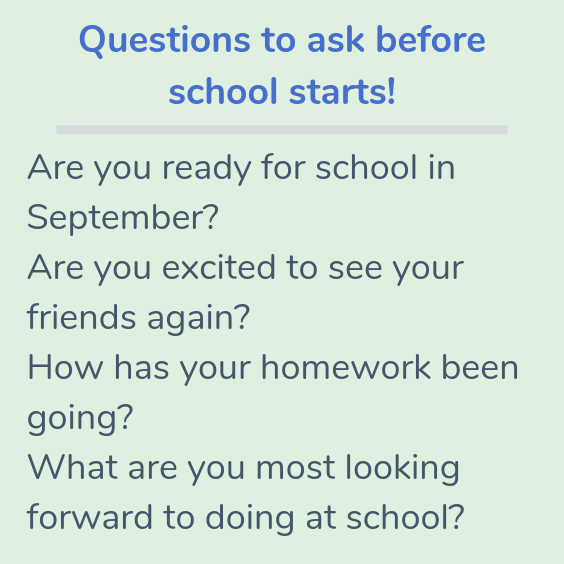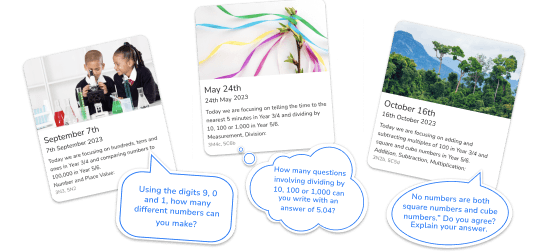Back To School Tips For Parents: 10 Ways To Help Your Child Get Ready And Excited For Primary School!
With the summer holidays hurtling towards an end, and school once again appearing on the horizon, many parents are now turning their attention to the ways they can help prepare their child to go back to school.
As you may already know, persuading your child that school is going to be fun after a summer of swimming, football and anything else they may have been getting up to is going to be difficult, but that is why we are here to help with our back to school tips for parents!
This blog is part of our series of blogs designed for parents supporting home learning and looking for home learning resources during the Covid-19 epidemic.
1. Watch out for growth spurts: Sort out their uniform well in advance
Primary school is a time of learning and growth for your child, and the latter of the two also means that there will be physical changes too.
Between the ages of 6-11 it can feel as if your child is getting taller on a daily basis, and unfortunately for parents this means that a new school uniform may be needed come September if your child has outgrown their old one.
One simple back to school tip for parents is to check whether or not last years jumper, trousers and skirt all still fit, and if not head to the shops well before they are due to head back to school.
By going one week early you will greatly reduce the chance of hearing a saddened:
“Mum/Dad, my jumper doesn’t fit anymore!” coming down the stairs at 7am on the first day of school…
Now all that’s left is to cross your fingers that there is not another growth spurt between the time you shop and the time school starts!
2. Do some fun learning activities to get back into the swing of things
After finishing a whole year of learning, the last thing your child is going to want to do is carry this on at home. That’s why the first 2 or 3 weeks of the summer holiday present the perfect opportunity for your child to relax, play and enjoy themselves.
FREE Holiday Maths Pack for Year 3, 4, 5, and 6
A fun set of maths revision packs to help KS2 beat the dreaded "summer brain drain" during the holidays. Including 20 challenges for each year group!
Download Free Now!However, with the summer slide causing children to struggle to retain the information they picked up throughout the school year, it is important that you help ease them back into learning before they go back to school.
This doesn’t mean that your child needs to sit at a desk with a test paper every day, but try introducing some fun maths games and activities into your everyday routines to help them practice their maths skills and ensure that they are prepared to tackle whatever the next school year throws at them. See our summer maths activities for inspiration.
3. Get a tutor to help prevent the summer slide
For many parents, time is precious over the summer holidays, and any time that they have with their child they want to spend having fun!
The summer holidays are a fantastic opportunity for you to spend some quality time with your child, doing all the things you never get a chance to in term time (did somebody say a trip to the beach…?).
However, if you want to spend your summer tucking into picnics and visiting the pool with your child, but still want to ensure they practise their school-based skills over the holidays then a tutor could be the answer.
4. Talk to them about the new school year
Put simply, this is one of the most important back to school maths tips for parents!
Whether they are moving up to primary school for the first time, heading into their final year or anything in between, starting a new school year can be an anxious and confusing time for young minds.
One of the best things you can do to calm any pre-school nerves is to discuss how your child is feeling about the new year. Simple, open-ended questions are a fantastic way to learn about any issues or fears they may be having.

By gently encouraging your child to answer these types of questions, you will be able to dig a little deeper and help them if anything out of the ordinary comes up and it appears that they are in anyway stressed about the new school year.
It is much better to discuss any issue now before they have a chance to build up throughout the school year.
5. Encourage your child to regain some of their independence
Over the summer holidays it can be easy for children to become slightly reliant on you to do things for them. Chances are that at school they will be more responsible for small things like making sure their book bags are packed at the end of the day, and getting their work done on time, but at home this may not be the case.
Spend some time encouraging your child to act independently before they go back to school, and they will be well prepared by the time the first bell rings.
6. Talk enthusiastically about school to build up excitement
As you will know, every child is different.
Some love the thought of going in to see their friends and learn new things on a daily basis in school.
Others find it very difficult to leave their parents for a day and are therefore not huge fans of going into school.
To overcome the latter of the two types of children, begin to speak about school in a positive light before they head back into the classroom. Talk them through all of the fun things they will be doing over the year, and discuss the friendships they will build.
A bit of parental reassurance can go a long way in the eyes of a primary school child.
7. Create routines to help them get their term-time sleeping patterns back on track
Over the summer holidays it can be easy for “bed time” to change due to the long summer days and the often incessant “Can I just stay up for another 10 minutes…”
There is of course nothing wrong with children enjoying another 10 minutes of freedom in the evenings when the most stressful activity the following day is a fun-filled trip to their grandparents or the swimming pool, but when they have school the following day it is a different story.
Ensuring children get enough sleep before school starts is vital for good behaviour and concentration.
A tired child is a distracted child.
The first few days back at school can be very tiring, so whilst you should be prepared to battle through the complaints you will get, make sure your child has good sleeping habits before they go back to school.
8. Organise some play dates with friends that will be in their class
It doesn’t matter if they are heading back to the same class full of their friends from last year or if they are moving up to primary school and will be with a whole new group of potential friends, try to arrange a play date with some of the other children that will be in their class.
The calming presence of other children their age who will be going through the same thing that they are about to will help your child (and their friends) to relax before tackling the new school year.
Things are always easier when you have friends behind you, and this is a back to school tip for parents that is very easy to implement.
9. Prepare for the unexpected
Along with the routine of term-time also comes the opportunity for the unexpected to happen.
You may be unlucky enough for your car to suffer a breakdown one morning on the school run.
Your child may be unfortunate enough to catch a cold and need to come home to recuperate.
Or, you may have to go into work early one morning and be unable to take your child into school.
It goes without saying that it is impossible to plan for every single eventuality, but by having a back-up option for school drop-offs and pick-ups, you can rest assured that if the emergencies ever do come up you will be covered!
10. Run through and practice the things your child will be covering in the year
One of the most daunting things facing a child in the run up to school is all of the new knowledge that will be coming their way. With lots of things to learn, it can be a little overwhelming if children are not adequately prepared before they head into the classroom.
Fortunately though, you can help!
Getting your child ready for Year 3
Year 3 represents a new start for children as they move into KS2, and this means that there is a lot to learn!
How to help your child prepare for Year 3 English
You can:
- Increase the variety of genres your child is reading – Newspapers, plays, books and poems are a good place to start.
- Encourage them to make predictions about what is coming up in a story.
- Practice handwriting skills, with a focus on joining letters.
- Practice using conjunctions such as when, after and because.
How to help your child prepare for Year 3 maths
You can:
- Work on adding and subtracting 3-digit numbers.
- Practice the 3, 4 and 8 times tables.
- Introduce them to fractions of quantities and equivalent fractions.
- Practice other areas of maths including telling the time, angles, and presenting data in graphs and tables.
How to help your child prepare for Year 3 science
You can:
- Teach them about plants (including parts of a plant and their life cycles).
- Teach them about animals (including humans) and their skeletons, muscles and nutrition.
- Help them learn more about light and reflections.
- Look into forces and magnets in a fun way!
Getting your child ready for Year 4
In Year 4 your child will likely be settled into their class and looking forward to going back to school, but there are still ways you can help them prepare for this over the summer.
How to help your child prepare for Year 4 English
You can:
- Continue to increase the variety of genres your child is reading to introduce them to a wider vocabulary and different writing styles.
- Make sure they practice their joined up handwriting, helping them to keep it as neat as possible.
- Encourage them to think about the plot of stories in a more in depth manner, perhaps even helping them to come up with a story of their own.
How to help your child prepare for Year 4 maths
You can:
- Work on adding and subtracting 4-digit numbers.
- Practice all of the times tables, up to 12.
- Work with them to introduce decimals.
- Practice other areas of maths including telling the time, angles, and presenting data in graphs and tables.
How to help your child prepare for Year 4 science
You can:
- Teach them about habitats of both plants and animals.
- Teach them about animals (including humans) and their eating habits, including food chains.
- Help them learn more about states of matter (evaporation, condensation and freezing are good places to start).
- Help them discover the world of electrical circuits
Getting your child ready for Year 5
Lots of new ideas and concepts will be introduced in Year 5, so the summer is a good time to help them prepare for this.
How to help your child prepare for Year 5 English
You can:
- Help them learn more about figurative language and how it is used.
- Practice spelling of more complex words, with both prefixes and suffixes.
- Work with them to introduce more and more punctuation into their writing.
How to help your child prepare for Year 5 maths
You can:
- Help them get to a stage with addition, subtraction, multiplication and division where they are comfortable knowing which to use in different situations.
- Work on area and perimeter of shapes.
- Help them interpret line graphs and tables.
How to help your child prepare for Year 5 science
You can:
- Teach them about habitats of both plants and animals.
- Teach them about animals (including humans), focusing on changes from birth to old age.
- Help them learn more about Earth and space.
- Help them discover the world of forces, including gravity and friction.
Getting your child ready for Year 6
This is the year within which the KS2 SATs take place, so by introducing your child to some of the concepts they will be learning about before school starts, they will have a headstart upon their return!.
How to help your child prepare for Year 6 English
You can:
- Help them learn more about figurative language and how it is used.
- Practice spelling of more complex words, with both prefixes and suffixes.
- Work with them to introduce more and more punctuation into their writing.
- Help them learn more about synonyms and antonyms.
How to help your child prepare for Year 6 maths
You can:
- Help them learn about square, prime and negative numbers.
- Work on multiplying and dividing 4 digit numbers.
- Help them understand ratio and proportion.
- Introduce them to coordinates and pie charts.
How to help your child prepare for Year 6 science
You can:
- Teach them about living things and habitats, including microorganisms, plants and animals.
- Teach them about animals (including humans), focusing on diet and exercise.
- Help them learn more about evolution and genetics, including looking at fossils, reproduction and adaptation.
- Help them discover more about light, including how it travels.
Have fun this summer with our back to school tips
Whilst the summer should be a time of enjoyment for children, it is certainly wise to make sure they are prepared for school come September. By introducing a few simple steps, and through some organization in the run up to September, you can ensure that your child will have a smooth transition into the new school year.
If you have any other back to school tips for parents in your position, let us know and we will add them to the list!
Related articles:
DO YOU HAVE STUDENTS WHO NEED MORE SUPPORT IN MATHS?
Every week Third Space Learning’s maths specialist tutors support thousands of students across hundreds of schools with weekly one to one tuition designed to plug gaps and boost progress.
Since 2013 these personalised one to one lessons have helped over 150,000 primary and secondary students become more confident, able mathematicians.
Learn how pupils make accelerated progress or request a personalised quote for your school to speak to us about your school’s needs and how we can help.





